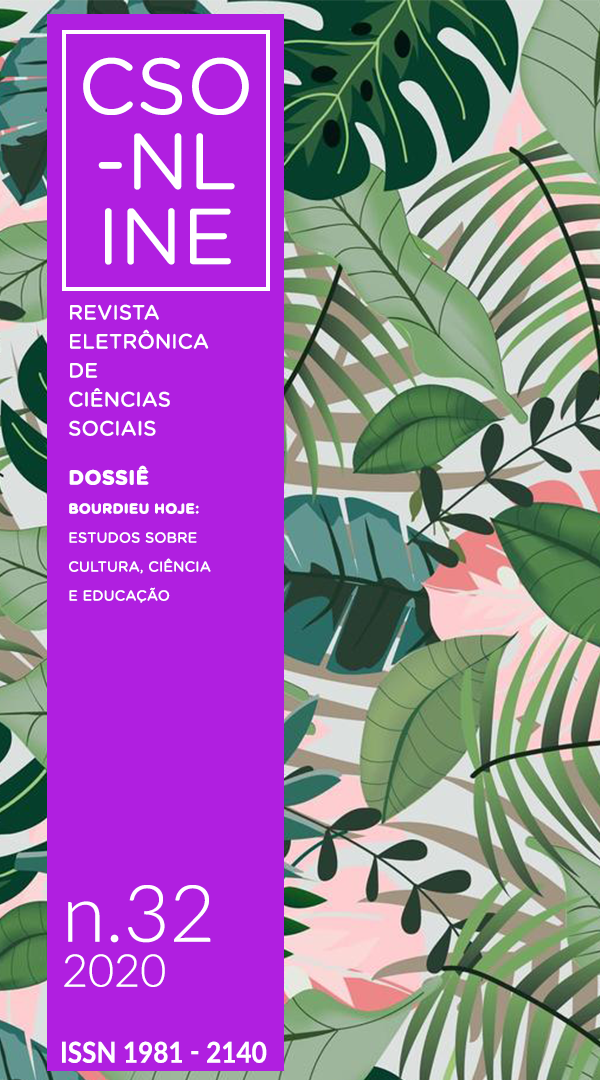O interesse pelo desinteresse: contribuições de Bourdieu para a reflexão da escrita no campo acadêmico
DOI:
https://doi.org/10.34019/1981-2140.2020.32424Palavras-chave:
Bourdieu, Campo acadêmico, Conhecimento, Violência simbólica, Escrita acadêmicaResumo
A escrita acadêmica não apenas transmite o conhecimento – ela o cria. É um sistema simbólico, um instrumento estruturado e estruturante do conhecimento e da comunicação que cria ativamente as epistemologias. Por ser um sistema simbólico, ela cumpre a função política de imposição ou de legitimação da dominação. Diante disso, este artigo está interessado na dominação do interesse pelo desinteresse de expor e demarcar o “eu” na escrita acadêmica – resultante do interesse do campo científico em expressar a ciência de forma neutra, impessoal, universal e acabada. O interesse de escrever sobre essa temática foi acionado pelas leituras das escritas de Pierre Bourdieu – escritas que carregam uma estética de repetição e de jogos de palavras, que jogam o jogo acadêmico a sério, que apresentam as regras do próprio jogo fazendo da sociologia uma arma contra o desconhecimento do reconhecimento – contra a violência simbólica. Essa violência é silenciosa, suave, insensível e invisível às suas próprias vítimas. Ela também está impregnada na cultura do campo acadêmico e pode ser notada nos aspectos técnicos e formais de seu estilo de escrita – na sua forma. A partir de uma análise bibliográfica da teoria de Bourdieu e da objetivação participante – da socioanálise proposta por ele – pretendo apresentar algumas reflexões sobre a violência simbólica presente na forma da escrita acadêmica, utilizando como base para a escrita deste artigo a minha própria práxis enquanto leitora da teoria bourdieusiana e enquanto escritora e pesquisadora da escrita acadêmica.
Downloads
Referências
BECKER, Howard. Truques da escrita: para começar e terminar teses, livros e artigos. Rio de Janeiro: Zahar, 2015.
BOURDIEU, Pierre. A distinção: crítica social do julgamento. São Paulo: Edusp; Porto Alegre: Zouk, 2007.
BOURDIEU, Pierre. As Regras da Arte: Gênese e Estrutura do Campo Literário. São Paulo: Companhia das Letras, 1996a.
BOURDIEU, Pierre. Homo academicus. 2 ed. 1 reip. Florianópolis: Ed. da UFSC, 2017.
BOURDIEU, Pierre. O Poder Simbólico. Tradução Fernando Tomaz. Rio de Janeiro: Bertrand Brasil, 1989.
BOURDIEU, Pierre. Os usos sociais da ciência: por uma sociologia clínica do campo científico. São Paulo: Edunesp, 2004.
BOURDIEU, Pierre. Gostos de classe e estilos de vida. In: ORTIZ, Renato (Org.). Pierre Bourdieu: sociologia. São Paulo: Ática, 1983a. p. 82-121.
BOURDIEU, Pierre. O campo científico. In: ORTIZ, Renato (Org.). Pierre Bourdieu: sociologia. São Paulo: Ática, 1983a. p. 122-155.
BOURDIEU, Pierre. Questões de sociologia. Rio de Janeiro: Marco Zero Limitada, 1983b.
BOURDIEU, Pierre. Razões práticas: sobre a teoria da ação. Campinas: Papirus, 1996b.
DELEUZE, Gilles. O abecedário de Gilles Deleuze. Entrevista com G.Deleuze. Editoração: Brasil, Ministério da Educação, TV Escola, 2001. Paris: Éditions Montparnasse, 1997, VHS, 459min.
DELEUZE, Gilles; GUATTARI, Félix. O anti-Édipo: Capitalismo e Esquizofrenia. Rio de Janeiro: Imago, 2004.
NIETZSCHE, Friedrich. A genealogia da moral. Lisboa: Guimarães e Cia. Editores, 1976.
NIETZSCHE, Friedrich. Aurora: Reflexões sobre os preconceitos morais. Tradução: Antonio Carlos Braga. Editora Escala: São Paulo, 2007.
SMITH, Adam. The Theory of Moral Sentiments. Oxford: Oxford University, 1982.
Downloads
Publicado
Como Citar
Edição
Seção
Licença
Copyright (c) 2020 CSOnline - REVISTA ELETRÔNICA DE CIÊNCIAS SOCIAIS

Este trabalho está licenciado sob uma licença Creative Commons Attribution 4.0 International License.
Todos os artigos científicos publicados na CSOnline – Revista Eletrônica de Ciências Sociais estão licenciados sob uma Licença Creative Commons







